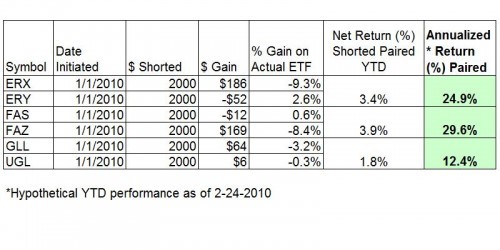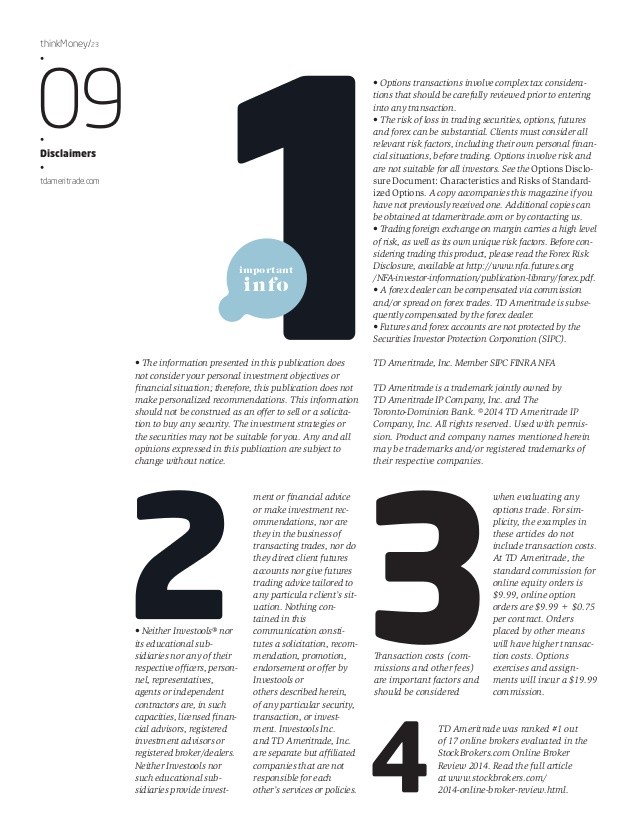Why Everything You ve Heard About Leveraged ETFs Is Wrong
Post on: 13 Июль, 2015 No Comment

by Michael Johnston on August 4, 2009 | Updated November 1, 2012 | ETFs Mentioned: RSU RSW SDS TZA
Leveraged ETFs have been in the news a great deal lately, although the majority of the coverage has been less than flattering. Over the last week, several prominent financial institutions have ceased purchasing leveraged ETFs on behalf of their clients, citing the incompatibility of the short-term nature of these products with their long-term views on investing. Moreover, the returns that these products generate in certain markets have been criticized as misleading and even dishonest, implying that leveraged ETFs are some sort of a scam designed to rip off hard-working, middle class investors. Enough is enough. Its time to dispel a lot of the myths surrounding leveraged ETFs that have been circulating in recent weeks. Like almost any investment, leveraged ETFs can be used inappropriately. But if used appropriately (and there are a lot of investors who are doing so), these products can be extremely powerful and efficient investment vehicles.
Divisive Issue
Perhaps no recent issue has divided the investor community as sharply as the current controversy over these leveraged funds. On the one hand are sophisticated investors, such as day traders and hedge funds. The introduction of leveraged ETFs coincided with the reduction or elimination of many traditional sources of leverage for these investors amidst the global credit crunch, making leveraged funds an ideal match for this exclusive group that has the ability to take significant risks and the resources to monitor investments with a very careful eye. Leveraged ETFs provide a convenient alternative to traditional means of accessing leveraged exposure, such as options, says Carl Resnick, ETF Portfolio Strategist at Rydex/SGI. On the other hand are smaller, less sophisticated investors that manage their portfolio for a few hours a week and often make decisions based on gut instincts and limited amounts of research. The former has embraced leveraged ETFs, fully aware of their limitations and intended uses. The latter, however, may be less inclined to complete the research and ongoing monitoring required to ensure that leveraged ETFs dont erode portfolio returns. And this is where the problems arise.
ETFdb Pro members can read more (including a guide to rebalancing with leveraged ETFs) in our Leveraged Equities ETFdb Category report [For more ETF analysis, make sure to sign up for our free ETF newsletter or try a free seven day trial to ETFdb Pro ].
Seven Misconceptions About Leveraged ETFs
There has been a great deal written about leveraged ETFs, almost all of which has focused on drawbacks and limitations and much of which has been misleading or just plain wrong. Heres a look at seven of the biggest misconceptions about leveraged ETFs, as well as an explanation of the truth behind these oft-maligned funds.
1. Leveraged ETFs dont perform as theyre supposed to. This is perhaps the biggest and most frustrating misconception about leveraged ETFs. Leveraged ETFs, for the most part, perform exactly as they are supposed to. The key here is to examine performance on a daily basis. Earlier this year I looked at the performance of several ProShares 200% ETFs, including the Ultra Russell 2000 (UWM ) and UltraShort Russell 2000 (TWM ). Nine days out of ten. these funds had returns within 50 basis points of their target daily objective, a stellar performance considering the use of significant leverage in these funds (see more information on TWMs fact sheet ).
The criticism of leveraged ETFs is that they dont perform as some investors expect them to. This criticism shouldnt really be directed at leveraged ETFs, but rather at the investors who fail to understand them. There has been a general misunderstanding about how the funds behave in certain market environments, says Andy ORourke, head of marketing at Direxion Funds. If you expect them to perform on the multiple of their underlying index over multiple trading sessions, you have a misunderstanding of the fund. The amount of literature available on the complexities and nuances of leveraged ETFs, both from issuers and third-party analysts, is astounding. Which brings me to the second misconception about leveraged ETFs:
2. Leveraged ETFs can only be understood by sophisticated investors. Although leveraged ETFs use complex financial instruments. such as swaps and futures, theyre actually not that difficult to understand. Consider the following (admittedly simplified) example of a 3x leveraged ETF with $100 million in assets:
This fund must maintain $300 million of net exposure to the funds underlying index. To achieve this level of exposure, the fund enters into various swaps and futures contracts. Now say the benchmark index declines 1% over a trading session. The loss of $3 million from the total exposure of $300 million decreases the ETFs assets from $100 million to $97 million, an amplified loss of 3%. At this point, the fund must reduce its exposure by $6 million to achieve total market exposure of $291 million (3x the ETF assets of $97 million). Now its exposure is back to three times the level of its assets. And then the fund does the same thing the next day. Thats it, folks. Yes, the instruments used to achieve the returns are complex, but the general mechanics dont require an advanced degree to understand and certainly should be within the grasp of any individual qualified to make investment decisions for either himself or others.
The relative simplicity of the manner in which leveraged ETFs achieve their investment objectives makes the inability or unwillingness of investors to understand their nuances all the more inexcusable.
3. Leveraged ETFs will underperform when held for multiple trading sessions. A great misconception about leveraged ETFs is that when held over long periods of time, they will always underperform the daily target multiple of the benchmark index return. While this definitely occurs in certain markets. it is by no means a sure thing (and in fact the exact opposite happens in a lot of situations). In a steadily increasing market, leveraged bull ETFs will tend to rise by more than the simple multiple of the index gains. Consider a situation in which the underlying index increases by 3% for five consecutive days:

In such an instance, the hypothetical 3x leveraged ETF would return about 54%, or 600 basis points more than three times the return on the index over the period. And the examples of this occurrence arent purely hypothetical. Direxions Daily Technology Bull 3x Shares (TYH ) was recently up more than 115% on the year, while the underlying Russell 1000 Technology Index has jumped about 37% (see charts of TYH here ). We just went through a time of record volatility, and a lot of people have judged leveraged ETFs based on their performance during this period, says Michael Sapir, ProFunds Group Chairman and CEO. Over time, there is a good chance of having compounding work for you.
The issues of leveraged ETFs arise when markets seesaw. alternating between gains and losses. Since leveraged ETFs rebalance their exposure daily (as discussed above), this means they increase exposure before markets fall and cut exposure before markets rise. Consider another example of six days during which the underlying index is volatile on a daily basis, but unchanged over the period:
4. Leveraged ETF issuers prey on retail investors. This is one of the more worrisome misconceptions about the marketing and promotion of leveraged ETFs. As a result of the concerns raised over the suitability of leveraged ETFs for certain classes of investors, leveraged ETF issuers have been unjustly vilified. It seems that many people believe these firms are targeting Joe Investor, using misleading advertising practices to make a quick buck off of hard-working Americans they con into plowing their whole paychecks into leveraged ETFs. This couldnt be further from the truth. Take a look at the literature and warnings leveraged ETF issuers have plastered all over their web sites, and then tell me that their advertising practices are deceptive:
- Direxions home page. as well as its Education Center. particularly Understanding Leveraged Exchange-Traded Funds
- ProShares Literature Center , including Understanding Long-Term Performance of Leveraged and Short Funds
- Rydex annual reports. which contain a thorough discussion on the compounding of returns, the phenomenon that has caused a great deal of the controversy surrounding these funds
We continually stress the fact that leveraged ETFs seek to meet a daily investment objective, says Resnick, whose firm offers several 200% leveraged ETFs including the Rydex 2x S&P 500 ETF (RSU ) and the Rydex Inverse 2x S&P 500 ETF (RSW ). See more information about RSW on its fundamentals page and Download 101 ETF Lessons Every Financial Advisor Should Learn
5. Use of leveraged ETFs is rampant among average investors. Perhaps the most frustrating aspect of the campaign against leveraged ETFs has been the lack of any sort of empirical data. All evidence of abuse of these products by investors or asset managers has been purely anecdotal. Ironically, it took the banning of the purchase and sale of leveraged ETFs by several major financial institutions to shed some light on just how many (or how few) ETF investors are using leveraged ETFs inappropriately. Since news of suspensions of leveraged ETF sales at major brokerages have been announced (Edward Jones made its decision around July 20, and UBS, Ameriprise, LPL, Morgan Stanley, and Wells Fargo have subsequently either suspended/restricted leveraged ETF sales or begun a review of their policies), trading volumes have hardly moved, indicating that bans of these products through certain channels have hardly impacted their primary user base. Below are daily volumes (in millions of shares) for two of the most popular leveraged ETFs over the last two weeks:














